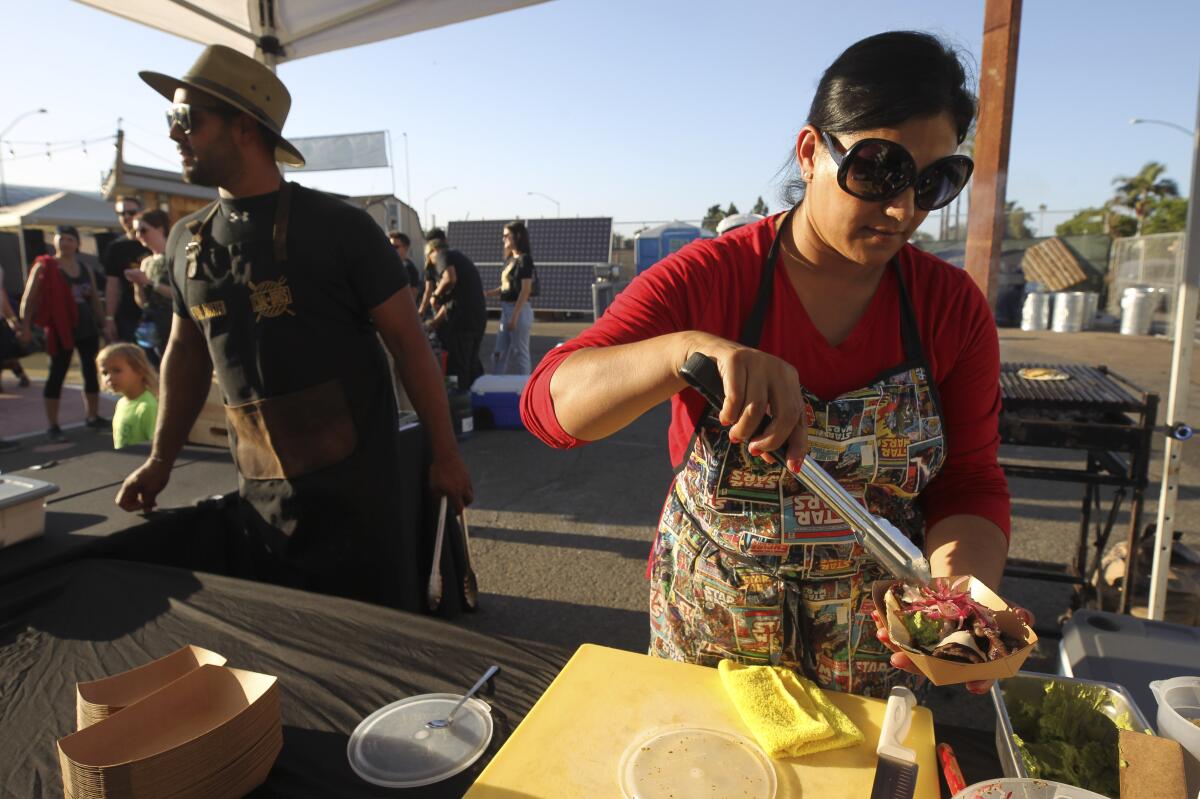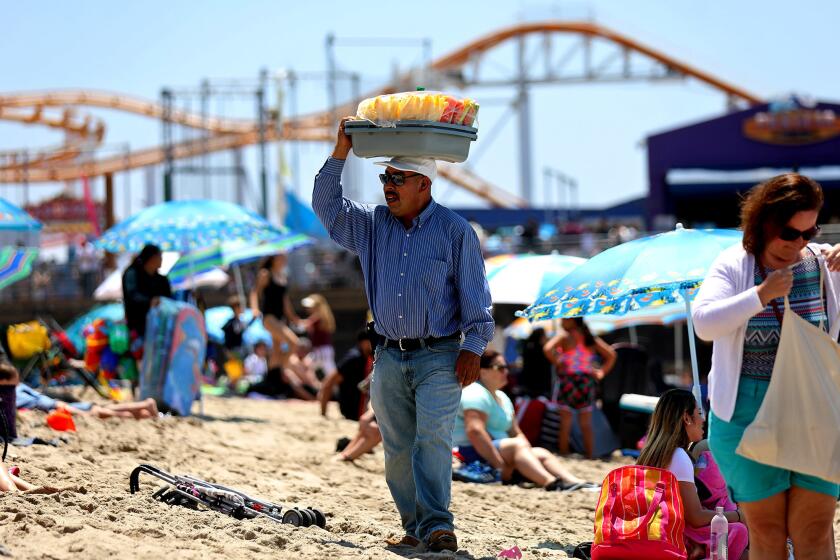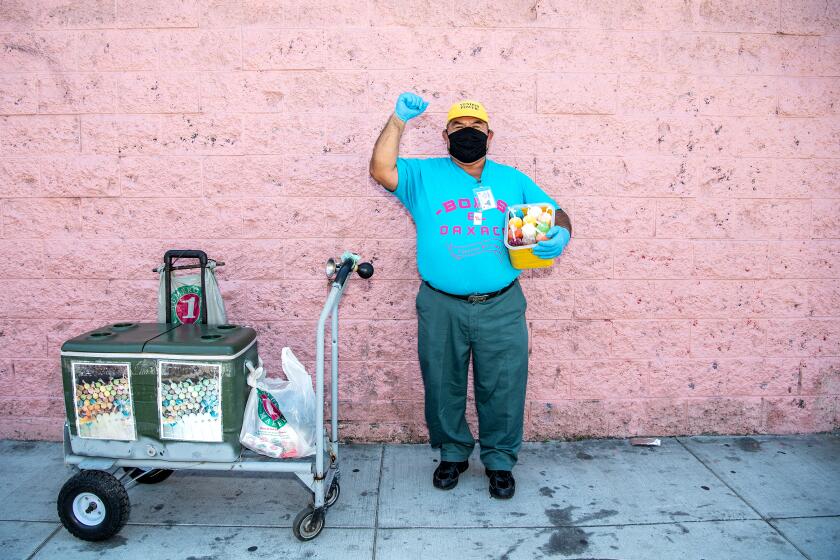San Diego reviving controversial proposal to regulate pushcart street vendors

San Diego may finally get long-awaited rules this spring for sidewalk pushcart vendors, a growing part of the local economy that faced a possible ban from some business districts and tourist areas in 2019.
San Diego Mayor Todd Gloria plans to revive regulations that were abandoned midstream by his predecessor, Mayor Kevin Faulconer, after backlash from advocates for minorities and low-income residents.
Supporters of new regulations say a city crackdown is needed to fight chaotic and dangerous conditions created by vendors who illegally dump trash, don’t handle food hygienically and block access to restrooms, emergency lanes or mass transit.
Critics say onerous regulations would destroy the fledgling businesses of thousands of low-income residents, many of them immigrants with families. Some also say the city’s initial proposal had racist overtones.
A state law that took effect two years ago aimed to encourage a new class of small entrepreneurs by loosening rules on sidewalk street vendors.
The law, the Sidewalk Safe Vending Act, gave cities power to regulate pushcarts but limited that power to issues of health and safety. It specifically prohibits rules limiting economic competition with brick-and-mortar businesses.
Omar Avila is lucky — unlike most of the vendors who sell their wares along the bustling Santa Monica Pier, his pushcart is licensed, plastered with permits, and has an A grade from the Los Angeles County Department of Public Health.
Gloria, who supported the law — Senate Bill 946 — while in the state Assembly, plans to propose city legislation that will satisfy all groups, said his deputy chief of staff, Nick Serrano.
“Mayor Gloria is committed to working with all stakeholders, particularly our immigrant and business communities, to bring forward an ordinance to the City Council’s Economic Development and Intergovernmental Relations Committee this spring that will balance economic opportunities with public safety priorities,” Serrano said.
Many community leaders and business groups have been lobbying for revival of the regulations Faulconer proposed in early 2019 but then abandoned later that year.
Faulconer’s staff has attributed that to the COVID-19 pandemic, which shifted the mayor’s attention to other priorities.
The sharp reduction in tourism during the pandemic has reduced complaints about pushcart vendors in places such as the embarcadero and outside Petco Park.
But pushcarts have remained controversial in other areas, including Pacific Beach, where the community’s Town Council sent Faulconer a letter demanding action shortly before his term in office ended Dec. 10.
L.A.’s street vendors are grounded and facing a new Goliath: COVID-19.
Before getting elected, Gloria acknowledged that a world without pushcart regulations was a kind of “Wild West” and committed to gathering input from all sides.
Faulconer was criticized for basing his proposed legislation only on complaints from merchant groups and community leaders, not from pushcart operators. His staff said it was hard to reach vendors because there is no central organization representing them.
The Center on Policy Initiatives, a local think tank focused on progressive policies, has helped advocate for street vendors during the process.
Ana Laura Martinez, the center’s leadership development coordinator, said Monday that she hopes Gloria will propose regulations that aren’t “overly restrictive” and don’t affect entrepreneurial opportunities for minority groups.
Because Gloria supported the street vendor law while in Sacramento, Martinez said she is optimistic that Gloria knows what’s at stake.
Martinez said the city’s previous attempt at legislation was marred by wording that critics could have called racist or microaggressive regarding the presence of immigrants and minorities in tourist areas.
She said the proposed rules implied that street vendors were a nuisance and an eyesore, when they could be characterized as a colorful and welcome addition to the streetscape.
Critics of the vendors say it’s important for the city to limit them to the spirit of the state law, instead of allowing the vendors to sell almost anything.
Faulconer’s proposal would have banned pushcarts in such high-traffic tourist areas as the Balboa Park Botanical Building and Lily Pond, Sunset Cliffs Natural Park and the boardwalks in Mission Beach and La Jolla Shores.
They also would have been prohibited near Petco Park on Padres game days and near the convention center when a convention is under way.
They wouldn’t have been allowed near bike racks, scooter corrals, tables, benches, parking meters, utility boxes and fire hydrants or within 15 feet of an intersection, building entrance or public restroom.
In addition to saying that city rules must be based on health and safety, the state law says vendors who violate city rules can only be fined, not prosecuted criminally.
Other San Diego County cities that have approved pushcart regulations include Carlsbad, Vista, El Cajon and National City.
Garrick writes for the San Diego Union-Tribune.
More to Read
Sign up for Essential California
The most important California stories and recommendations in your inbox every morning.
You may occasionally receive promotional content from the Los Angeles Times.













